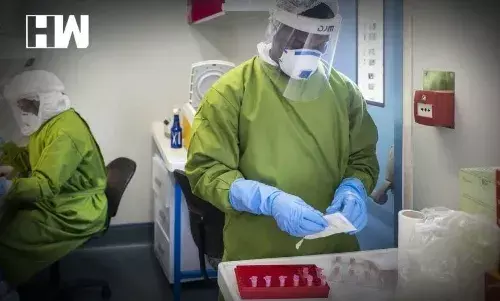A combination of factors, including misinformation that the pandemic is over, the lifting of mask mandates, ending physical distancing – and a more transmissible Omicron BA.2 variant – are causing an increase of COVID-19 cases globally, the World Health Organization warned on Wednesday.
“After several weeks of declines, reported cases of COVID-19 are once again increasing globally, especially in parts of Asia”, WHO Director-General Tedros Adhanom Gebreyesus told journalists in Geneva.
In the past week, the agency has seen an 8 per cent increase in detection of COVID-19 cases, with more than 11 million positive test results.
“These increases are occurring despite reductions in testing in some countries, which means the cases we are seeing are just the tip of the iceberg”, Tedros explained, warning that when cases tick up, so do deaths.
He added that continued local outbreaks and surges are to be expected, particularly in areas where measures to prevent transmission have been lifted, but that there are ‘unacceptably high’ levels of mortality in many countries, especially where vaccination levels are low among susceptible populations.
“Each country is facing a different situation with different challenges, but the pandemic is not over“, he reiterated.
A combination of factors
WHO’s Dr. Maria Van Kerkhove explained that a combination of factors is fuelling the increase of cases worldwide, beginning with a more transmissible variant.
“We still have Omicron which is transmitting at a very intense level around the world. We have sub-lineages of Omicron BA.1 and BA.2. BA.2 is more transmissible, and this is the most transmissible variant we have seen of the SARS-COV2 virus to date”, she warned.
The COVID-19 Technical Lead informed that in the last 30 days of more than 400,000 sequences sampled, 99.9% are Omicron, and 75% correspond to the BA.2 variant.
“We do not see an increase in severity with BA.2. However, with huge numbers of cases you will see increase hospitalisations and we have seen this in country after country”, Dr. Van Kerkhove highlighted.
Another factor influencing the increase of numbers is the lifting of public health and social measures.
“Lifting of the use of masks, lifting of physical distancing, lifting of restrictions limiting people’s movement, this provides the virus an opportunity to spread”, Dr. Van Kerkhove cautioned.
The expert also pointed out that there are ‘huge amounts of misinformation’ causing a lot of confusion among people.
“The misinformation that Omicron is mild, misinformation that the pandemic is over, misinformation that this is the variant that we will have to deal with”, she explained.
The virus has ‘not settled down’
Meanwhile, Dr Mike Ryan, WHO’s Executive Director of the Health Emergencies Programme clarified that the virus has not ‘settled down’ into a purely seasonal or predictable pattern yet.
“So, the idea that ‘we are through with it’ in the northern hemisphere and now we have to wait until next winter, I think (for example) when we look at increasing rates in the UK, we need to be very vigilant and cautious with this”, he said.
The expert added that the virus is still ‘very fit’ and it’s moving around easily and in the context of waning immunity and vaccines not acting perfectly against infection, the virus will likely continue to echo around the world.
“It will be high in some parts sometimes and then move and be higher again, it will move to another area where immunity is waning. The virus will pick up pockets of susceptibility, and we will survive on those pockets for months until another pocket opens.
“This is how viruses work. They establish themselves in a community and they will move quickly to the next community that’s unprotected”, he further explained saying that experts have seen similar patterns with the polio virus.
“We completely understand that the world needs to move on and wants to move on from COVID-19 but this virus spreads very efficiently between people and if we don’t have the right interventions in place the virus will take opportunities to continue to spread, and the more the virus spreads the more opportunities it has to change”, Dr. Van Kerkhove added.
Vaccination and vigilance
Both doctors and WHO chief Tedros also spoke about the importance of vaccination pointing out that the majority of deaths remain amongst the unvaccinated, and older individuals and people with underlying conditions who have not received the full course of effective vaccines.
“We need to reinstate the importance in every country. This is not just a North-South issue. Every country needs to look again at vaccination levels on the most vulnerable whether using booster policies or not and ensure that at the very minimum every individual who is vulnerable has two doses of effective vaccines”, Dr. Ryan urged.
Dr. Van Kerkhove explained that the data shows that COVID-19 vaccines remain ‘incredibly’ effective to prevent severe disease and death, including against Omicron.
She added that the world also needs a very strong surveillance system for COVID-19 to be aware of how the virus is evolving.
“Despite all of the challenges that we are facing, we still to maintain testing, we still need to maintain robust sequencing and making sure that we have geographic representation of the sequences that are shared”, she underscored.
As an independent media platform, we do not take advertisements from governments and corporate houses. It is you, our readers, who have supported us on our journey to do honest and unbiased journalism. Please contribute, so that we can continue to do the same in future.

